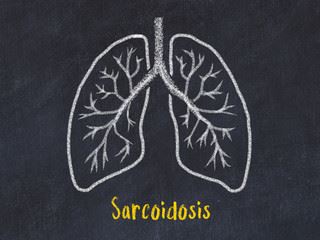
Sarcoidosis is a relatively rare multisystem immune disorder that causes inflamed lumps of tissue (called granulomas) to form and adhere to various body organs. Common symptoms include fatigue, lack of energy, shortness of breath, cough, and skin rashes/nodules. Treatment may involve the use of nonsteroidal anti-inflammatory drugs, corticosteroids, pulmonary rehabilitation, and/or physical training.
Kahlmann at al. [Lancet Respiratory Medicine] tested whether an on-line version of Mindfulness-Based Cognitive Therapy (eMBCT) reduces stress and fatigue in patients with sarcoidosis.
The study randomly assigned 99 Dutch adults with sarcoidosis (average age = 50 years; 59% female) who scored >21 points on a fatigue scale to receive standard care plus eMBCT or standard care alone. eMBCT is an 8-session online mindfulness-based cognitive therapy program initially designed to treat fatigue in cancer patients.
Participants were deemed to have completed the program if they completed 6 of the 8 sessions within a six-month window. They were also encouraged to engage in additional audio-guided home practice 30-minutes a day, 6 days a week.
Seventy-eight percent of the participants who began eMBCT completed at least 6 sessions in six months. It should be also noted, however, that a third of the potential participants assigned to eMBCT declined participation following an initial explanation of what the program entailed. Many thought it too time-consuming or had negative associations with mindfulness. This high decline rate (and the COVID pandemic) caused researchers to change their assignment protocol midway through, assigning a higher proportion of participants to the eMBCT than initially planned.
Participants were assessed at baseline, after program completion (or for controls at 3 months) and at three months after completion (or for controls at six-month follow-up). The study primary outcome was a change in fatigue ratings. Secondary outcomes were changes in sarcoidosis health status, anxiety, depression, and mindfulness (Frieburg Mindfulness Inventory).
Results showed that by post-intervention, the fatigue levels in the eMBCT group decreased significantly from baseline (-4.5 points) while controls showed no such significant decline (-0.9 points).
At six-month follow-up, eMBCT participants largely maintained their improvement (-4.0 from baseline), while controls slightly improved (-1.9 from baseline).
At post-intervention, 60% of the eMBCT group had a clinically meaningful improvement in fatigue level (defined by either a ≥ 4 point or 10% change) while only 26% of the controls had a clinically meaningful improvement.
Patients in the eMBCT group also showed significantly larger decreases in anxiety and depression and improvements in mindfulness and overall health status than controls at post-intervention and follow-up.
The study supports eMBCT as an effective treatment for reducing sarcoidosis-related fatigue. The study is limited by its reliance on a treatment-as-usual control instead of an active comparator. The fact that many mindfulness and control patients were assessed at different time intervals relative to the completion of the intervention also complicates study interpretation.
Reference:
Kahlmann, V., Moor, C. C., van Helmondt, S. J., et al. (2022). Online mindfulness-based cognitive therapy for fatigue in patients with sarcoidosis (TIRED): A randomised controlled trial. The Lancet Respiratory Medicine.
Link to study